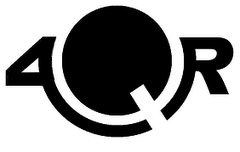The 4QR Project
- Nov 22, 2011
- 3 min read
A couple years ago I had the idea that QR codes could be slightly more useful if you could change the destination
the code was already printed all over everything. I set out to come up with a way to do that.
The first thing I learned about QR codes was that since they are simply data, the shorter the string being encoded, the less data, the smaller the code needed to be. Meaning, in the same amount of physical space, the squares in the code are bigger, thus easier/faster to read for a camera phone. When I see giant codes, I know that they've encoded the full text of what they want the reader to see in the code itself. This is poor on a number of fronts, as it's more data that can be corrupted by a smudge or tear (even with error correction) and it's also harder to read for a phone, since alignment and resolution matter. The other thing is the content itself-- why put text, when you can put a URL and put all the text you want on the page you send the user to?
So, small strings meant better codes. Great. How about a short URL? Those are pretty small. I could use Bit.ly or tinyurl.com and take a big webpage address and shorten it. That was a start, but it meant that I would have to change the destination page if I wanted the content to change. Not as awesome.
Then I thought about a re-direct on the short URL itself. That was the ticket. Make a short URL that you can point anywhere you want. Encode
URL in the QR code, and there you have it-- a QR code that you can change after the fact. Great for applications like contests where you may want to take a user somewhere after the contest is over, but before your billboard comes down. Or if you're an individual and you want to have your own code. You may want it to go your LinkedIn profile for now, but then later when you get your own site, or start a business, you want the code to go there... You wouldn't want to have to tell everyone you've given a business card or brochure to that they need to get a new one, or go somewhere else, you just change the code.
Needless to say, the idea caught on anecdotally, and my private beta at http://4qr.me garnered a few hundred people who were interested in getting a 'Code for Life'. However, I've found it more useful to just have a URL shortener that I control, that I can see web analytics for and that I can use for projects where needed.
I think the next thing I'd like to do with the codes is put them on stickers. We'll start sticking them on interesting things and have the code destination be a kind of wiki for that physical location. People can leave comments, virtual graffiti, interesting facts or history, etc... If I were to crowd source the 'sticking' of the little stickers, it could take off a lot faster... Another fun nut to crack... It would be like an open source version of Yelp, where you can see what people say about things, but only while you're physically at the code. People could use the codes for scavenger hunts, leaving notes for others, or really anything they wanted... If the code ever went missing or was scratched off, a new code could be put in it's place (any code) and simply redirected to the old page...
Hundred of years from now, digital archaeologists will attempt to understand what all these codes do (unless of course Google or Amazon S3 is still around, in which case they can simply scan the codes themselves with an antique smartphone from the early 21st century...)





Comments